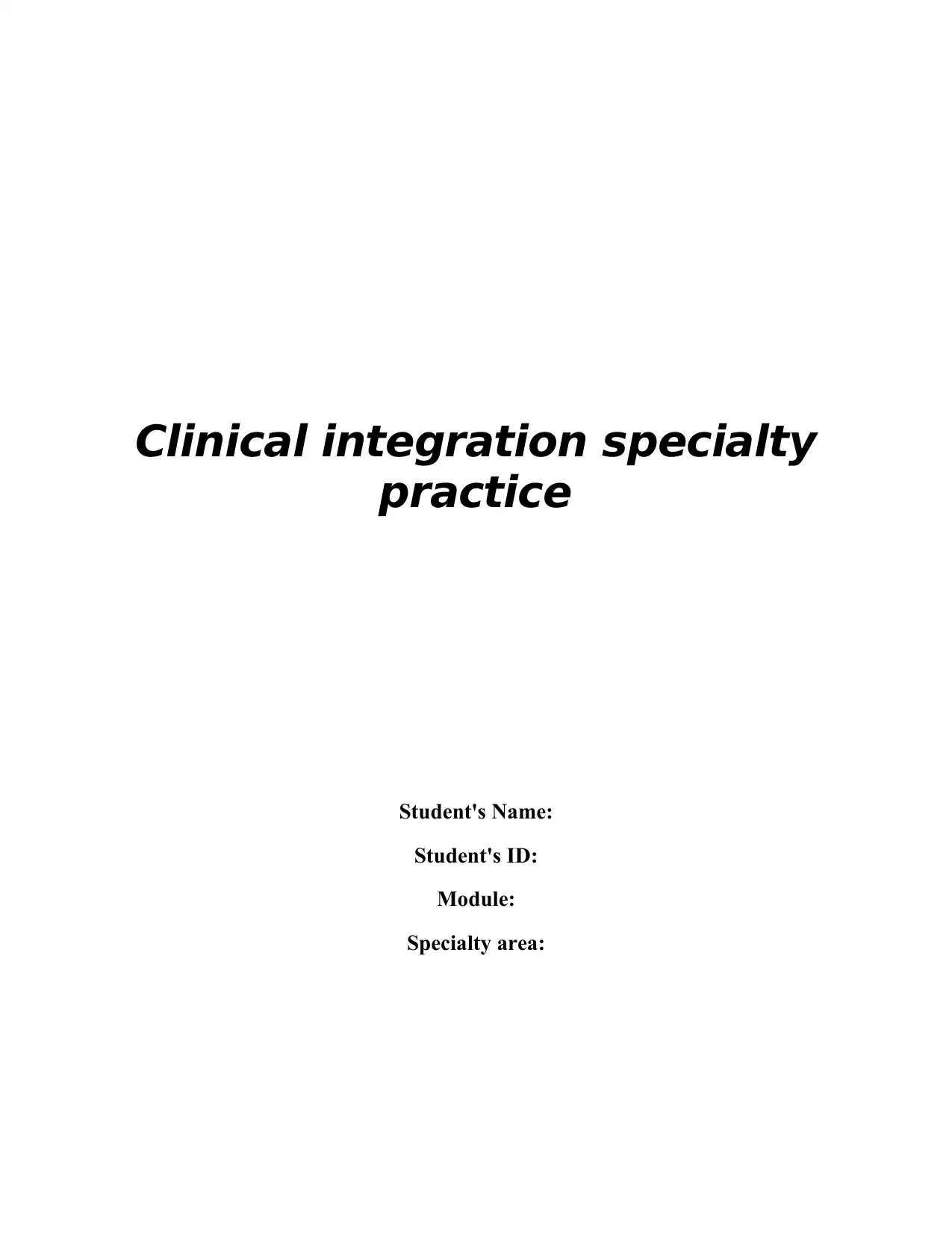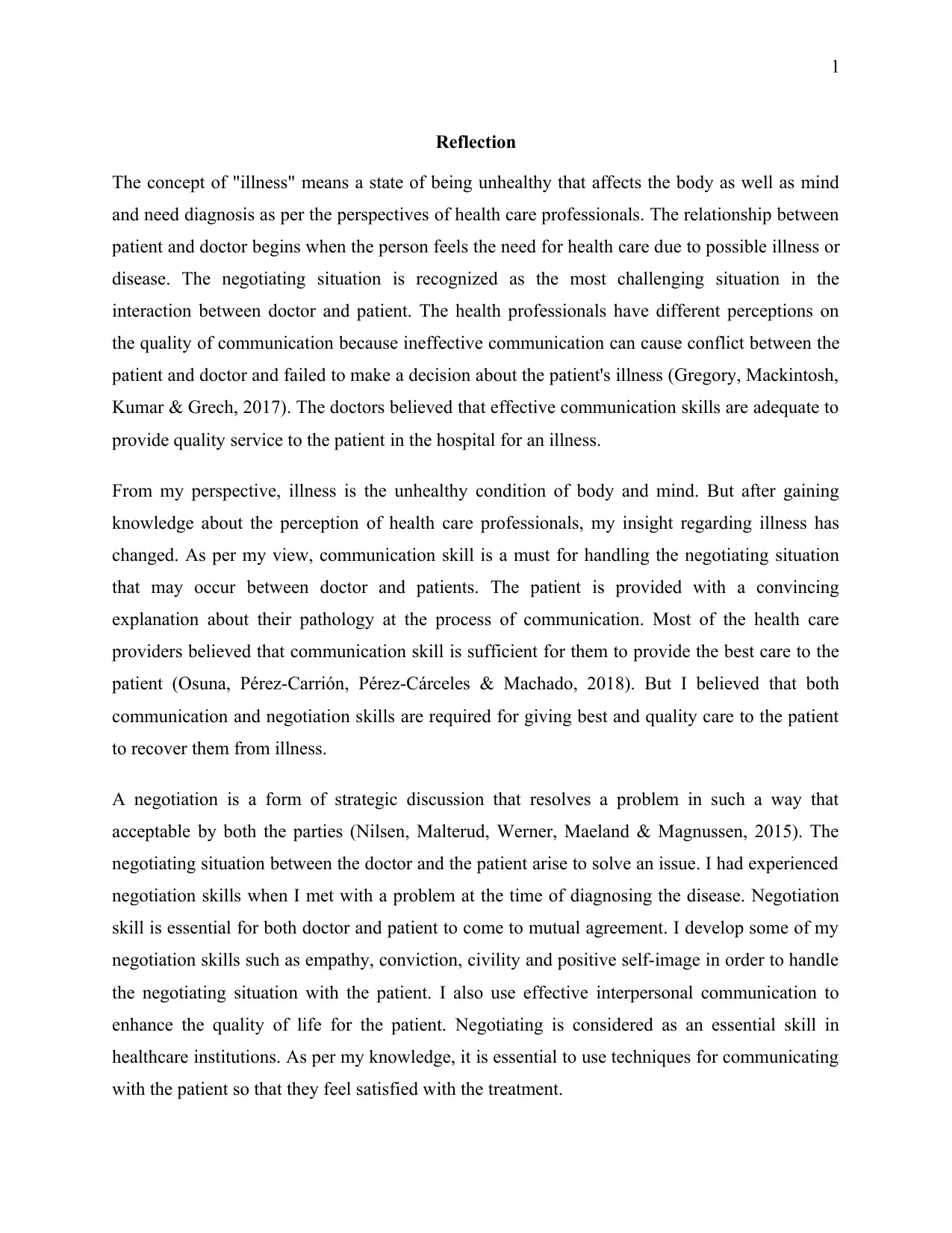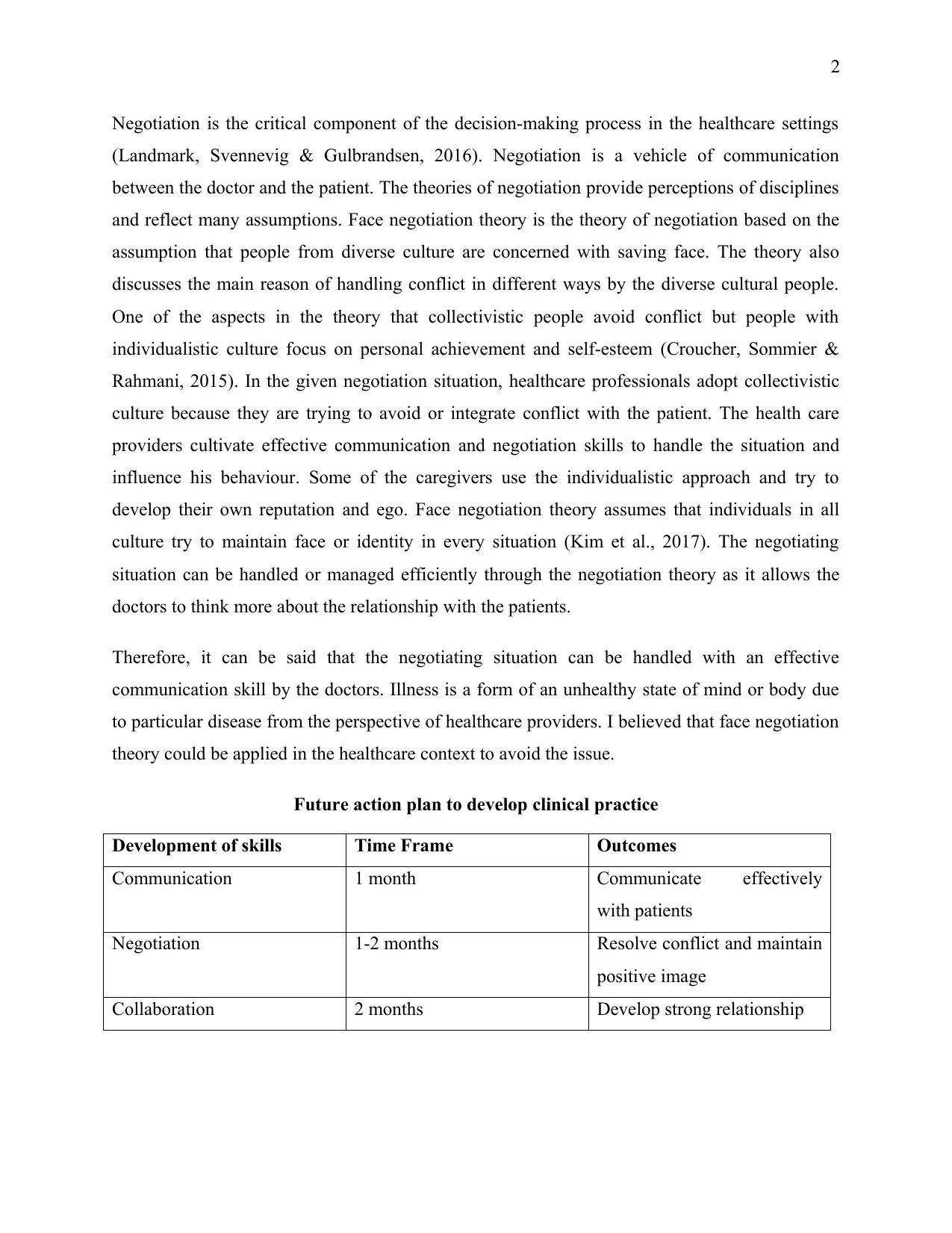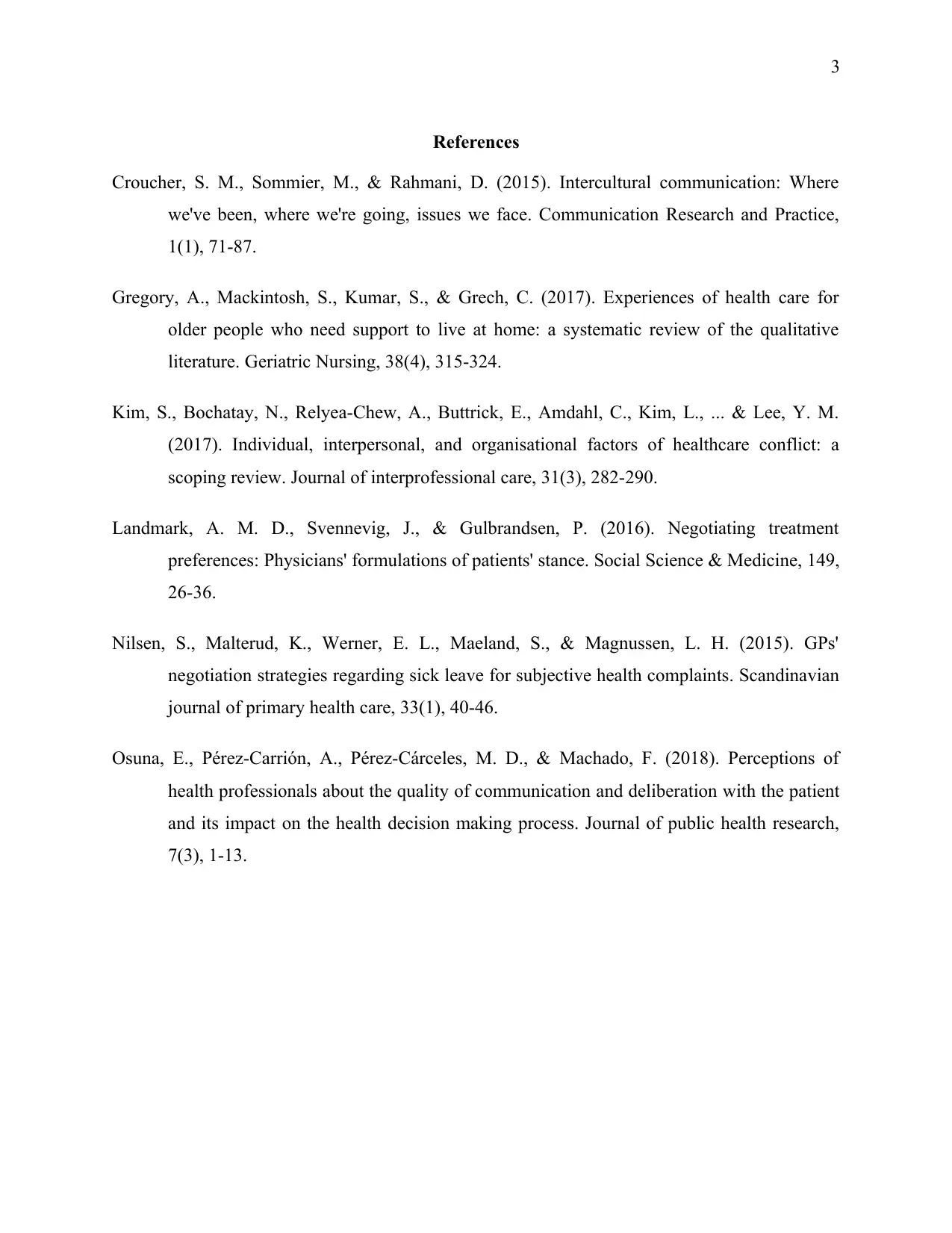NRSG370 Module 1 Assignment: Clinical Reflection on Illness Meaning
VerifiedAdded on 2022/10/01
|4
|1105
|152
Report
AI Summary
This assignment presents a student's reflection on the concept of illness from the perspective of healthcare professionals, patients, and their families, focusing on the importance of communication and negotiation skills in clinical practice. The reflection explores the student's evolving understanding of illness, emphasizing the need for effective communication to handle negotiating situations with patients. The student discusses the application of the face negotiation theory in healthcare contexts, highlighting the cultural aspects of conflict resolution. The assignment also includes a future action plan for developing clinical practice skills, such as improving communication, negotiation, and collaboration abilities. References to relevant literature support the reflection, providing a comprehensive analysis of the subject matter.

Clinical integration specialty
practice
Student's Name:
Student's ID:
Module:
Specialty area:
practice
Student's Name:
Student's ID:
Module:
Specialty area:
Paraphrase This Document
Need a fresh take? Get an instant paraphrase of this document with our AI Paraphraser

1
Reflection
The concept of "illness" means a state of being unhealthy that affects the body as well as mind
and need diagnosis as per the perspectives of health care professionals. The relationship between
patient and doctor begins when the person feels the need for health care due to possible illness or
disease. The negotiating situation is recognized as the most challenging situation in the
interaction between doctor and patient. The health professionals have different perceptions on
the quality of communication because ineffective communication can cause conflict between the
patient and doctor and failed to make a decision about the patient's illness (Gregory, Mackintosh,
Kumar & Grech, 2017). The doctors believed that effective communication skills are adequate to
provide quality service to the patient in the hospital for an illness.
From my perspective, illness is the unhealthy condition of body and mind. But after gaining
knowledge about the perception of health care professionals, my insight regarding illness has
changed. As per my view, communication skill is a must for handling the negotiating situation
that may occur between doctor and patients. The patient is provided with a convincing
explanation about their pathology at the process of communication. Most of the health care
providers believed that communication skill is sufficient for them to provide the best care to the
patient (Osuna, Pérez-Carrión, Pérez-Cárceles & Machado, 2018). But I believed that both
communication and negotiation skills are required for giving best and quality care to the patient
to recover them from illness.
A negotiation is a form of strategic discussion that resolves a problem in such a way that
acceptable by both the parties (Nilsen, Malterud, Werner, Maeland & Magnussen, 2015). The
negotiating situation between the doctor and the patient arise to solve an issue. I had experienced
negotiation skills when I met with a problem at the time of diagnosing the disease. Negotiation
skill is essential for both doctor and patient to come to mutual agreement. I develop some of my
negotiation skills such as empathy, conviction, civility and positive self-image in order to handle
the negotiating situation with the patient. I also use effective interpersonal communication to
enhance the quality of life for the patient. Negotiating is considered as an essential skill in
healthcare institutions. As per my knowledge, it is essential to use techniques for communicating
with the patient so that they feel satisfied with the treatment.
Reflection
The concept of "illness" means a state of being unhealthy that affects the body as well as mind
and need diagnosis as per the perspectives of health care professionals. The relationship between
patient and doctor begins when the person feels the need for health care due to possible illness or
disease. The negotiating situation is recognized as the most challenging situation in the
interaction between doctor and patient. The health professionals have different perceptions on
the quality of communication because ineffective communication can cause conflict between the
patient and doctor and failed to make a decision about the patient's illness (Gregory, Mackintosh,
Kumar & Grech, 2017). The doctors believed that effective communication skills are adequate to
provide quality service to the patient in the hospital for an illness.
From my perspective, illness is the unhealthy condition of body and mind. But after gaining
knowledge about the perception of health care professionals, my insight regarding illness has
changed. As per my view, communication skill is a must for handling the negotiating situation
that may occur between doctor and patients. The patient is provided with a convincing
explanation about their pathology at the process of communication. Most of the health care
providers believed that communication skill is sufficient for them to provide the best care to the
patient (Osuna, Pérez-Carrión, Pérez-Cárceles & Machado, 2018). But I believed that both
communication and negotiation skills are required for giving best and quality care to the patient
to recover them from illness.
A negotiation is a form of strategic discussion that resolves a problem in such a way that
acceptable by both the parties (Nilsen, Malterud, Werner, Maeland & Magnussen, 2015). The
negotiating situation between the doctor and the patient arise to solve an issue. I had experienced
negotiation skills when I met with a problem at the time of diagnosing the disease. Negotiation
skill is essential for both doctor and patient to come to mutual agreement. I develop some of my
negotiation skills such as empathy, conviction, civility and positive self-image in order to handle
the negotiating situation with the patient. I also use effective interpersonal communication to
enhance the quality of life for the patient. Negotiating is considered as an essential skill in
healthcare institutions. As per my knowledge, it is essential to use techniques for communicating
with the patient so that they feel satisfied with the treatment.

2
Negotiation is the critical component of the decision-making process in the healthcare settings
(Landmark, Svennevig & Gulbrandsen, 2016). Negotiation is a vehicle of communication
between the doctor and the patient. The theories of negotiation provide perceptions of disciplines
and reflect many assumptions. Face negotiation theory is the theory of negotiation based on the
assumption that people from diverse culture are concerned with saving face. The theory also
discusses the main reason of handling conflict in different ways by the diverse cultural people.
One of the aspects in the theory that collectivistic people avoid conflict but people with
individualistic culture focus on personal achievement and self-esteem (Croucher, Sommier &
Rahmani, 2015). In the given negotiation situation, healthcare professionals adopt collectivistic
culture because they are trying to avoid or integrate conflict with the patient. The health care
providers cultivate effective communication and negotiation skills to handle the situation and
influence his behaviour. Some of the caregivers use the individualistic approach and try to
develop their own reputation and ego. Face negotiation theory assumes that individuals in all
culture try to maintain face or identity in every situation (Kim et al., 2017). The negotiating
situation can be handled or managed efficiently through the negotiation theory as it allows the
doctors to think more about the relationship with the patients.
Therefore, it can be said that the negotiating situation can be handled with an effective
communication skill by the doctors. Illness is a form of an unhealthy state of mind or body due
to particular disease from the perspective of healthcare providers. I believed that face negotiation
theory could be applied in the healthcare context to avoid the issue.
Future action plan to develop clinical practice
Development of skills Time Frame Outcomes
Communication 1 month Communicate effectively
with patients
Negotiation 1-2 months Resolve conflict and maintain
positive image
Collaboration 2 months Develop strong relationship
Negotiation is the critical component of the decision-making process in the healthcare settings
(Landmark, Svennevig & Gulbrandsen, 2016). Negotiation is a vehicle of communication
between the doctor and the patient. The theories of negotiation provide perceptions of disciplines
and reflect many assumptions. Face negotiation theory is the theory of negotiation based on the
assumption that people from diverse culture are concerned with saving face. The theory also
discusses the main reason of handling conflict in different ways by the diverse cultural people.
One of the aspects in the theory that collectivistic people avoid conflict but people with
individualistic culture focus on personal achievement and self-esteem (Croucher, Sommier &
Rahmani, 2015). In the given negotiation situation, healthcare professionals adopt collectivistic
culture because they are trying to avoid or integrate conflict with the patient. The health care
providers cultivate effective communication and negotiation skills to handle the situation and
influence his behaviour. Some of the caregivers use the individualistic approach and try to
develop their own reputation and ego. Face negotiation theory assumes that individuals in all
culture try to maintain face or identity in every situation (Kim et al., 2017). The negotiating
situation can be handled or managed efficiently through the negotiation theory as it allows the
doctors to think more about the relationship with the patients.
Therefore, it can be said that the negotiating situation can be handled with an effective
communication skill by the doctors. Illness is a form of an unhealthy state of mind or body due
to particular disease from the perspective of healthcare providers. I believed that face negotiation
theory could be applied in the healthcare context to avoid the issue.
Future action plan to develop clinical practice
Development of skills Time Frame Outcomes
Communication 1 month Communicate effectively
with patients
Negotiation 1-2 months Resolve conflict and maintain
positive image
Collaboration 2 months Develop strong relationship
⊘ This is a preview!⊘
Do you want full access?
Subscribe today to unlock all pages.

Trusted by 1+ million students worldwide

3
References
Croucher, S. M., Sommier, M., & Rahmani, D. (2015). Intercultural communication: Where
we've been, where we're going, issues we face. Communication Research and Practice,
1(1), 71-87.
Gregory, A., Mackintosh, S., Kumar, S., & Grech, C. (2017). Experiences of health care for
older people who need support to live at home: a systematic review of the qualitative
literature. Geriatric Nursing, 38(4), 315-324.
Kim, S., Bochatay, N., Relyea-Chew, A., Buttrick, E., Amdahl, C., Kim, L., ... & Lee, Y. M.
(2017). Individual, interpersonal, and organisational factors of healthcare conflict: a
scoping review. Journal of interprofessional care, 31(3), 282-290.
Landmark, A. M. D., Svennevig, J., & Gulbrandsen, P. (2016). Negotiating treatment
preferences: Physicians' formulations of patients' stance. Social Science & Medicine, 149,
26-36.
Nilsen, S., Malterud, K., Werner, E. L., Maeland, S., & Magnussen, L. H. (2015). GPs'
negotiation strategies regarding sick leave for subjective health complaints. Scandinavian
journal of primary health care, 33(1), 40-46.
Osuna, E., Pérez-Carrión, A., Pérez-Cárceles, M. D., & Machado, F. (2018). Perceptions of
health professionals about the quality of communication and deliberation with the patient
and its impact on the health decision making process. Journal of public health research,
7(3), 1-13.
References
Croucher, S. M., Sommier, M., & Rahmani, D. (2015). Intercultural communication: Where
we've been, where we're going, issues we face. Communication Research and Practice,
1(1), 71-87.
Gregory, A., Mackintosh, S., Kumar, S., & Grech, C. (2017). Experiences of health care for
older people who need support to live at home: a systematic review of the qualitative
literature. Geriatric Nursing, 38(4), 315-324.
Kim, S., Bochatay, N., Relyea-Chew, A., Buttrick, E., Amdahl, C., Kim, L., ... & Lee, Y. M.
(2017). Individual, interpersonal, and organisational factors of healthcare conflict: a
scoping review. Journal of interprofessional care, 31(3), 282-290.
Landmark, A. M. D., Svennevig, J., & Gulbrandsen, P. (2016). Negotiating treatment
preferences: Physicians' formulations of patients' stance. Social Science & Medicine, 149,
26-36.
Nilsen, S., Malterud, K., Werner, E. L., Maeland, S., & Magnussen, L. H. (2015). GPs'
negotiation strategies regarding sick leave for subjective health complaints. Scandinavian
journal of primary health care, 33(1), 40-46.
Osuna, E., Pérez-Carrión, A., Pérez-Cárceles, M. D., & Machado, F. (2018). Perceptions of
health professionals about the quality of communication and deliberation with the patient
and its impact on the health decision making process. Journal of public health research,
7(3), 1-13.
1 out of 4
Related Documents
Your All-in-One AI-Powered Toolkit for Academic Success.
+13062052269
info@desklib.com
Available 24*7 on WhatsApp / Email
![[object Object]](/_next/static/media/star-bottom.7253800d.svg)
Unlock your academic potential
Copyright © 2020–2026 A2Z Services. All Rights Reserved. Developed and managed by ZUCOL.




